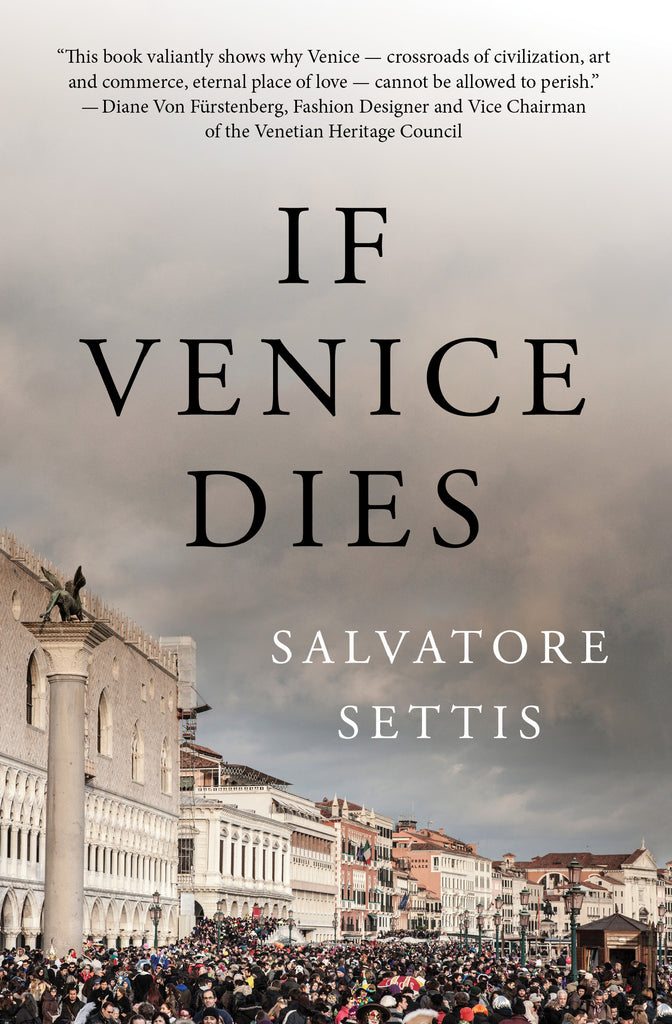In the tradition of Jane Jacobs’ The Death and Life of Great American Cities comes an urgent plea from internationally renowned art historian Salvatore Settis to preserve Venice’s future.
What is Venice worth? To whom does this urban treasure belong? Venetians are increasingly abandoning their hometown — there’s now only one resident for every 140 visitors — and Venice’s fragile fate has become emblematic of the future of historic cities everywhere as it capitulates to tourists and those who profit from them. In If Venice Dies, a fiery blend of history and cultural analysis, internationally renowned art historian Savatore Settis argues that “hit-and-run” visitors are turning landmark urban settings into shopping malls and theme parks. He warns that Western civilization’s prime achievements face impending ruin from mass tourism and global cultural homogenization. This is a passionate plea to secure Venice’s future, written with consummate authority, wide-ranging erudition, and élan.
In the tradition of Jane Jacobs’ The Death and Life of Great American Cities comes an urgent plea from internationally renowned art historian Salvatore Settis to preserve Venice’s future.
What is Venice worth? To whom does this urban treasure belong? Venetians are increasingly abandoning their hometown — there’s now only one resident for every 140 visitors — and Venice’s fragile fate has become emblematic of the future of historic cities everywhere as it capitulates to tourists and those who profit from them. In If Venice Dies, a fiery blend of history and cultural analysis, internationally renowned art historian Savatore Settis argues that “hit-and-run” visitors are turning landmark urban settings into shopping malls and theme parks. He warns that Western civilization’s prime achievements face impending ruin from mass tourism and global cultural homogenization. This is a passionate plea to secure Venice’s future, written with consummate authority, wide-ranging erudition, and élan.
| Published By | House of Anansi Press Inc — Sep 10, 2016 |
| Specifications | 192 pages | 5.25 in x 8 in |
|
Supporting Resources
(select item to download) |
Excerpt |
| Written By |
SALVATORE SETTIS is an art historian and archaeologist who has served as director of the Getty Research Institute in Los Angeles and the Scuola Normale Superiore in Pisa, Italy. He currently heads the Louvre Museum’s scientific council and has written several books of art history. |
| Written By |
|
SALVATORE SETTIS is an art historian and archaeologist who has served as director of the Getty Research Institute in Los Angeles and the Scuola Normale Superiore in Pisa, Italy. He currently heads the Louvre Museum’s scientific council and has written several books of art history. |
“[A] powerful work of cultural criticism … Chock-full of insight. It shines a harsh light on the risks in the way we live, much as Jane Jacobs did in The Death and Life of Great American Cities more than fifty years ago.” — Washington Post
“A bracing tonic … Enlightening.” — New York Times
“Brilliant … This book should be required reading for every citizen.” — New Criterion
“At once a moving eulogy for Venice and a resounding manifesto, enriched by a dense web of historic, literary, and cultural allusions.” — Publishers Weekly
“An impassioned plea that every lover of Venice, urban planner, architect, and cultural historian should read.” — Kirkus Reviews
“[An] eloquent polemic.” — Maclean’s
“A chilling account of the slow agony of Venice as illustrative of a global consumerist epidemic. Richly documented and imbued with deep angst about this supreme urban creation.” — Philippe de Montebello, former director of the Metropolitan Museum of Art
” —Philippe de Montebello, former director of the Metropolitan Museum of Art“Venice is indeed unique but it stands for all cities in this eloquent, furious blast against the commodification of our planet and the relentless destruction of human communities by the mentality of markets.” — Roger Crowley, author of City of Fortune: How Venice Ruled the Seas
” —Roger Crowley, author of City of Fortune: How Venice Ruled the Seas“Settis shows how the tragedy of Venice could happen to any city which has a past. It’s a powerful polemic.” — Richard Sennett, author of The Fall of Public Man and Flesh and Stone: The Body and the City in Western Civilization
” —Richard Sennett, author of The Fall of Public Man and Flesh and Stone: The Body and the City in Western Civilization“Venice is indeed unique but it stands for all cities in this eloquent, furious blast against the commodification of our planet and the relentless destruction of human communities by the mentality of markets.” — Roger Crowley, author of City of Fortune: How Venice Ruled the Seas
” —Roger Crowley, author of City of Fortune: How Venice Ruled the Seas“Settis shows how the tragedy of Venice could happen to any city which has a past. It’s a powerful polemic.” — Richard Sennett, author of The Fall of Public Man and Flesh and Stone: The Body and the City in Western Civilization
” —Richard Sennett, author of The Fall of Public Man and Flesh and Stone: The Body and the City in Western Civilization
